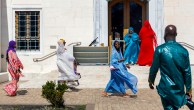
How U.S. Muslims compare with other Americans religiously and demographically
U.S. Muslims tend to be younger and more highly educated than other Americans. But they’re similar to Christians on many religiousness measures.
Numbers, Facts and Trends Shaping Your World
All
Publications
U.S. Muslims tend to be younger and more highly educated than other Americans. But they’re similar to Christians on many religiousness measures.
Catholics are one of the largest religious groups in the United States, outnumbering any single Protestant denomination.
Around six-in-ten U.S. atheists are men (64%). And seven-in-ten are ages 49 or younger, compared with about half of U.S. adults overall (52%).
The vast majority of religiously unaffiliated Black Americans believe in God and about half pray regularly, although few attend services.
Black American religious life is diverse, encompassing a wide range of religious affiliations, worship practices and beliefs.
Today, most Black adults say they rely on prayer to help make major decisions, and view opposing racism as essential to their religious faith.
The religious landscape of the United States continues to change at a rapid clip, with both Protestantism and Catholicism experiencing losses of population share.
Atheists and agnostics know more about religion than most other religious groups, while those with no particular religion are among the least knowledgeable.
Southern Baptists are the largest evangelical Protestant group in the United States. Yet the total number of Southern Baptists is falling.
About half of black Muslims are converts to Islam, a relatively high conversion level. Black Muslims, like black Americans overall, have high levels of religious commitment.
Notifications